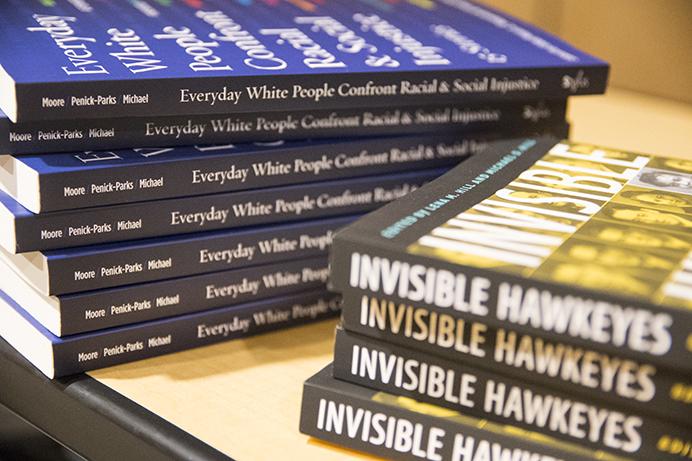By Charles Peckman
Although Iowa’s population is becoming more diverse, racism and ethnic disparities are still present.This was a center of discussion at conference that aimed to address a variety of issues regarding the black community in Iowa. Many organizations joined forces to present a conference called “The Future of Black Iowa” this past weekend at the Iowa City Public Library and University Capitol Center.
Eddie Moore Jr., who received a PH. D. from the UI and founded The Privilege Institute, an organization that focuses on diversity education and research and spoke at the conference, said he was excited to be back in Iowa City.
“As a black man, I have spent a considerable amount of my early developmental years and early professional years in Iowa,” he said. “I think my testimony as a black man speaking about the benefits I gained from Iowa contributed to why I was chosen for the roster this year.”
Moore lectured on diversity, privilege, and leadership in Iowa and focused on “the continuing, changing landscape of Iowa.”
“I really want to be a shining example for young black kids to see that even though you start with a tough beginning, it’s not where you have to end up,” he said.
The conference was hosted by the UI Center for Human Rights, African American Council, Black Student Union, Black Student Law Association, the city of Iowa City, the UI Society of Black and Professional Students, and the UI Chief Diversity Office.
Over the course of March 31 and April 1, other professionals such as doctors, lawyers, and professors, gave presentations about topics ranging from health care to medicine, education, and mental health.
Sherree Wilson, an associate dean of Cultural Affairs and Diversity Initiatives in the UI Carver College of Medicine, gave a keynote address March 31 about black Iowans and medicine.
Although Wilson said she was happy with the conference’s ability to bring up racial disparity in Iowa, she said there is still work to be done.
A lecture on April 1 called “Gender Issues in Health,” hosted by Denise Martinez, a professor and assistant dean of the Office of Cultural Affairs and Diversity Initiatives in the medical school, discussed race-related issues in the health-care system.
Martinez, whose former surname was Adams, described her dismay when patients made racially insensitive comments toward her with no regard for her racial identity.
“ ‘Dr. Adams,’ patients would say. ‘That’s so easy to say; I like that,’ ” Martinez said.
Ethnically insensitive comments from patients are commonplace for members of the medical community who are of a minority, she said.
Martinez advocated for cohesion among health-care workers and patients.
“It’s always important to establish a relationship with your primary-care physician,” she said.
Conference attendees then broke off into four groups to discuss disparities they have experienced in the health-care field.
Türel Tan, a UI German-Turkish exchange student who attended the lecture, described ethnic discrepancies in the German health-care system.
“I heard about this event from Professor [Lena M.] Hill, but I’m also here because of the refugee crisis in Europe,” Tan said. “People of color in Germany tend to go to doctors of color — if your German is not good, that poses a problem as well.”
The weekend’s events ended with a “final plenary,” in which the small groups reconvened and discussed an action plan — something that is vital to UI program coordinator Kathrina Litchfield, an organizer of the event.
“It’s one thing to talk about these issues, but it’s another to enact action,” she said.



